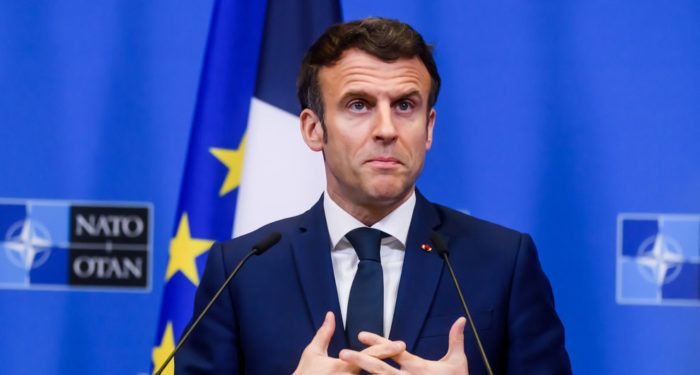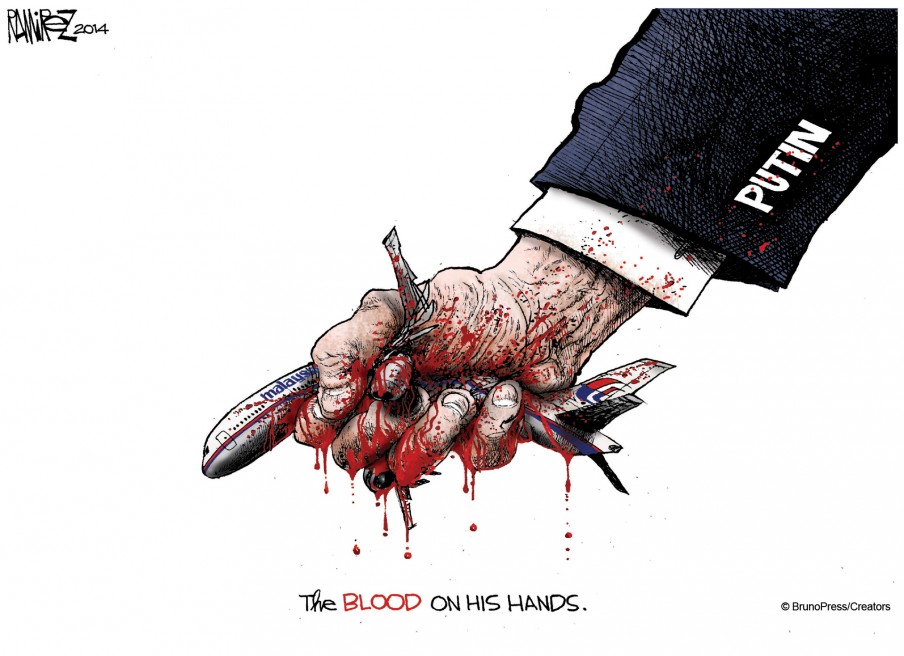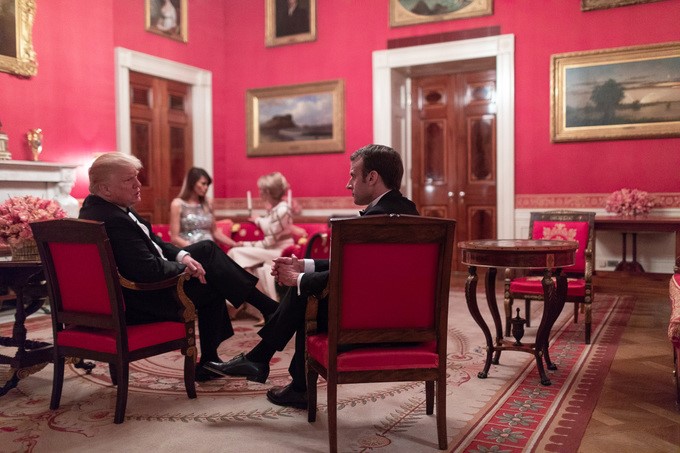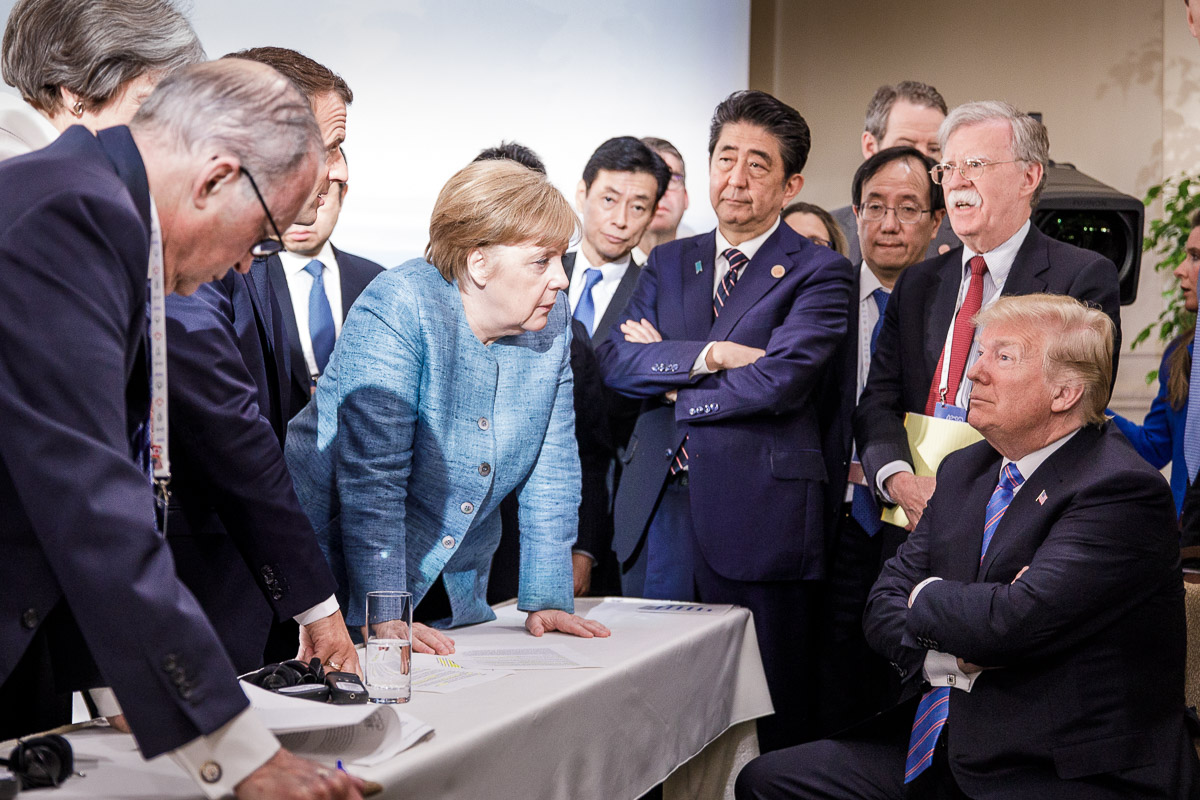“The West should consider how to address Russia's need for security guarantees if President Vladimir Putin agrees to negotiations about ending the war in Ukraine, French President Emmanuel Macron said. […] One of the essential points we must address - as President Putin has always said - is the fear that NATO comes right up to its doors, and the deployment of weapons that could threaten Russia, Macron said. That topic will be part of the topics for peace, so we need to prepare what we are ready to do, how we protect our allies and member states, and how to give guarantees to Russia the day it returns to the negotiating table, Macron said."
President Macron's remarks suggest that he is sympathetic to Russia’s claim of the need for security guarantees.
France has been one of the nations that fronted a diplomatic initiative that succeeded in transforming a low-intensity war into a full-scale invasion and full war. Not necessarily intentionally, but most definitely cynically, arrogantly and spinelessly.
Europe needs security guarantees, not Russia
President Macron represents the part of NATO that does not understand Russia and – more importantly – does not take advice from those who do. Unfortunately, he is not the only Head of State at fault.
By lending credibility to the Russian lies, Macron, however, support their strategic narrative and strengthens their influence operation and war in the cognitive space. The French president helps Russia influence millions in the West, including key decision and policymakers. He inadvertently helps Putin manipulate the West into making decisions that serve Russian interests, possibly believing that it also serves French interests to end the war no matter the costs.
The reality is that Russia does not need security guarantees. Europe needs security guarantees from Russia.
At the end of January and shortly before the start of the new phase of the soon 9-year-old war, I stressed that Russia has no reason to feel insecure: it is already protected by one of the most powerful armies in the world.
In an open letter to the German government, around 70 German experts on Eastern European Security argued that
“more nuclear warheads are stored in Russia than in the three NATO nuclear-weapon states USA, Great Britain and France put together. Moscow maintains a wide range of delivery systems for its thousands of nuclear weapons - from ICBMs to long-range bombers to nuclear submarines. It has one of the three most powerful conventional armies in the world and a right of veto in the UN Security Council. This makes the Russian Federation one of the militarily safest countries in the world.”
73 East Europe experts call on Germany to “fundamentally correct” Russia policy
Even though the Russian conventional Army, Air Force, and Navy have been dressed down and exposed as unprofessional in Ukraine, its Strategic Rocket Forces, Russian Aerospace Forces' Long-Range Aviation and the Russian Navy's ballistic missile submarines (Russia's nuclear triad) deter all possible (and unlikely) opponents from invading the Russian Federation. From a military perspective, it makes it the safest country on earth.
The Head of the Servant of the People parliamentary faction and former head of the Ukrainian negotiating group, Davyd Arakhamiia, nails it when he says:
“All Russia has to do is leave the territory of our country; pay reparations; punish all war criminals; voluntarily give up nuclear weapons. After that, we are prepared to sit down at the negotiating table and talk about security guarantees."
Russia does not need security guarantees because from a military perspective, is one of the safest countries on earth. The fact that it claims otherwise, does not make it true. We know from experience that the Russian truths way too often are lies.
The assessment is supported by the fact that NATO – a defensive military alliance consisting of 30 independent and sovereign countries, all with equal right to veto any decision that runs contrary to their core values and principles – is located at its western borders.
Even in the face of a full-scale war in Europe threatening Euro-Atlantic peace, security, and prosperity, most member states still lack the will to defend themselves and contribute to NATO's collective defense. Nine years after Russia started the war, 20 out of 30 countries do still not meet the NATO target of 2% of GDP for the defense budget.
During the Madrid Summit in June, the Alliance even reduced its level of ambition and committed to doing less.
The notion of a NATO eastward expansion is not only one of the biggest lies but also a testimony of the success of the Russian information campaign in the west and a demonstration of its ability to manipulate millions.
The Alliance has not “expanded eastwards” in the sense that it has been trying to encroach, contain and threaten Russia. It has been accepting the membership request from 14 independent and sovereign countries asking for NATO’s collective defense out of fear from the Russian Federation. NATO enlargement is only a consequence of their choice.
These countries always knew that Russia would continue to grow at the expense of its neighbors the moment it had recovered from the collapse of the Soviet Union. In November 2021, Putin's former adviser and the ideologist behind "Putinism", Vladislav Surkov, stated that constant expansion is at the heart of Russia's historical nature and argued that it would continue to expand. Its ongoing attempt to expand at the expense of Moldova, Georgia, Ukraine, and Belarus proves his appraisal accurate. It not at least captures the historical expansion of the Grand Duchy of Moscow into the present-day Russian Federation.
A country that has expanded constantly through war and occupation since it was a Grand Duchy, does not seek peace. The invasions of Georgia and Ukraine were not mistakes but deliberate and premeditated acts of violence to subjugate its neighbors.
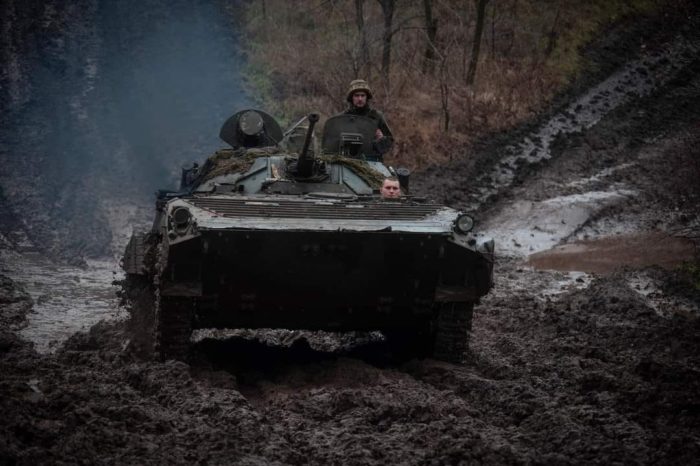
Europe’s and NATO’s security is threatened, not Russia’s
Russia has spread many myths about NATO. This includes claims that the alliance's presence in the Baltic countries is a danger, and that NATO is both encircling and trying to contain Russia. Not least, it claims that NATO is aggressive and a threat and that its enlargements threaten the country's security. All have been debunked by NATO.
Russia has repeatedly turned away from international agreements that reject its right to change borders by force; impose on other nations their will; to deny other countries the right to choose governance, security arrangements or alliances. By waging war and imposing its sphere of influence on its neighbors, Russia is acting in breach of the international security architecture that has laid the foundation for our common security.
In 1997, NATO promised to significantly reduce its military forces. And NATO did just that. Russia promised the same but chose instead to invade two countries.
The list of Russian aggressions includes not only its use of military force, but also coup attempts, interference in elections and referendums, disinformation, cyber-attacks, terrorist attacks, liquidations, restrictions on freedom of navigation, and more. The EU stated in September already that Russia is trying to destabilize the union from within, and concluded that the current Russian regime threatens European peace and security.
The country considers itself entitled to a sphere of interest. It demands a change in the international security architecture at the expense of smaller nations. It requires that NATO's presence and pattern of operations throughout Eastern, Central and Northern Europe be reduced at the expense of the countries' security needs. Not least, Russia seeks to weaken transatlantic cooperation, which has ensured our collective security for more than 75 years.
The notion that NATO is the problem is absurd. NATO didn’t invade Georgia; NATO didn’t invade Ukraine. NATO didn’t start a Hybrid War in Europe. NATO didn’t trigger the biggest refugee crisis since World War 2. NATO didn’t infringe on independent countries' right to choose governance, security arrangements, or alliances. NATO didn’t weaponize global food supplies. Russia did.
President Macron’s support of President Putin’s demands for security guarantees is, consequently, equally ludicrous.
In the words of the Institute for Study of War:
“Russia’s demanded security guarantees entail partially dismantling NATO by returning NATO to its 1997 borders and grants Russia a veto on future NATO expansion by demanding NATO suspend its “Open Door” policy.”
Negotiations are fundamentally impossible
Several Heads of State and international leaders have recently stressed that the more military successes Ukraine has, the stronger its position will be in future negotiations. The Chairman of the Joint Chiefs of Staff, Gen. Mark Milley, has said as much. NATO’s General Secretary, Jens Stoltenberg, has also stated the same.
Laying out what he described as "four core elements of consensus" in the Biden government, Sullivan recently stressed that only Ukraine could decide when and on what terms to negotiate. He added that any just peace must be based on the principles of sovereignty and territorial integrity and that the US will do all it can to make sure that Ukraine will be able to negotiate from a position of strength.
The US, NATO, and the EU have all failed to define the “red lines” Russia cannot cross. They have failed to respond to the Russian continuous escalation of the war, that being the energy war against Europe, its attempt to eradicate Ukrainian nationhood, its war on global food security or its destruction of the Ukrainian energy sector. They have also failed to publicly support the Ukrainian declared end-state (or define one themselves) or clarify what “support as long as it takes” means in practical terms.
It is, therefore, hardly surprising that they haven't outlined the preconditions for future negotiations. We have, however, seen multiple statements along the line that “most wars are ended at the negotiation table.” President Macron’s statement on negotiations and the need to address “security guarantees for Russia” could have been seen as an attempt to rectify this shortcoming if he hadn’t started the discussion with a huge concession, implying that Putin's lies represent the truth.
The West is, of course, split on the question of negotiations as well. While most support the idea of negotiations, many believe that now is not the time to be pursuing such a course of action, given that Ukraine has the initiative and can still strengthen its position on the ground. Most recognize that Russia today would use negotiation to reinforce and resupply while rebuilding its military power for further offensives.
Some countries like Hungary, Cyprus, and Italy, however, are openly in favor of talks with the Kremlin. France and Germany pushed the Minsk agreements (even though they could not possibly lead to peace) until the low-intensity war turned full-scale. Others who know Russia the best, like the Baltic States and Poland, question the wisdom of seeking a diplomatic solution before Russia is defeated and evicted from Ukraine altogether.
Russia never negotiates from a position of weakness. Having been repeatedly humiliated on the battlefield, Putin must either seek a diplomatic solution, dig in for a long fight, or escalate.
The Kremlin has only supported a diplomatic solution that fulfills its original demand, representing a Ukrainian defeat in all meanings of the word. Other alternatives are dismissed.
Recent escalations have already proven that Putin has chosen escalation and protracted war over diplomacy. He still believes the West to be weak and unable or unwilling to do what it takes to ensure a Russian defeat. While his strategic messaging says otherwise, he believes victory is within his reach as long as Russia is only facing Ukraine on the battlefield, the maritime blockade remains unchallenged and he is free to escalate without consequences. And not least, as long as the West talks about negotiations.
Generally, negotiation is seen as a strategic discussion that involves two or more parties that resolve an issue in a way that each party finds acceptable.
That solution is presently not possible due to Russian ultimatums and the fact that it has no intentions of withdrawing its forces from Ukraine. The war itself is defined as both unprovoked and unjustifiable by the international community.
Putin’s demands – supported by Russia’s atrocities in Ukraine – cannot possibly be fulfilled without undermining Ukrainian sovereignty and independence, putting both the country and the nation at risk.
Russia has nothing to offer but to stop aggression at the cost of oppression. Equally important, it is presently occupying Ukrainian territory in blatant violation of international law.
Furthermore, the Russian demands are nothing but blackmail. We do not succumb to extortion and we do not negotiate with a State Sponsor of Terrorism. The West cannot be seen as willing to undermine international law or shared values and principles “at any costs”. Equally important, it is not in our interest to see a country that over centuries has grown at the cost of its neighbors, continue to grow.
It is time to recognize that 8 years of negotiations led to a full-scale war because they were conducted on unequal terms. Russia negotiated from a position of strength, having demonstrated that it was willing to use all available means – including military power – to achieve its strategic aim and objectives. The West – under German and French leadership – negotiated from a position of weakness, clearly stating that military options were off the table. We lacked the will Russia and Ukraine had in abundance but failed to enable Ukraine.
Unfortunately, President Biden’s effort to ensure a united NATO going forward only helped bolster this approach. Prioritization of unity and NATO veto rights have ensured that the weakest link defines the Alliance’s highest ambition.
According to ISW:
Russia is attempting to capitalize on the Western desire for negotiations to create a dynamic in which Western officials feel pressed to make preemptive concessions to lure Russia to the negotiating table. […] The Kremlin likely intends to create a dynamic in which Western officials offer Russia preemptive concessions in hopes of convincing Russia to enter negotiations without requiring significant preliminary concessions of Russia in return.
Putin’s, Lavrov’s, and Peskov’s statements highlight what some of those desired preemptive concessions may be: decreased Western financial and military aid to Ukraine, recognition of Russia’s illegal annexation of Ukrainian territory, and restrictions on NATO and Western military actions in Europe. […]
Russia would benefit from a temporary agreement with Ukraine and Western countries that creates a pause in hostilities that allows Russia to strengthen the Russian Armed Forces for future military operations in pursuit of maximalist goals in Ukraine. Putin has shown little interest in such a ceasefire, however, and the Kremlin continues to make demands that are tantamount to full Western surrender, suggesting that Putin remains focused on pursuing military victory.”
This is very much in line with the assessment I made in my articles Now is not the time for Russia-Ukraine "peace" negotiations and Putin is asking the West to surrender Ukraine, international law, and its core values and principles.
All talks of future negotiations while keeping military options off the table serve one purpose – and one purpose only: It confirms the Russian perception of the West as weak, and strengthens its resolve and belief that victory is possible.
Until the US, NATO, and the EU can articulate the preconditions for negotiations and put military power behind their demand, they need to stop talking about negotiations. They urgently need to start talking about a Ukrainian victory and a Russian defeat.
They need to align their strategic messaging to that of their most important partner, Ukraine.
Negotiations will not happen until the return of all of Ukraine's occupied territories, and the talks would be about Russian compensation for damage caused by the war and the prosecution of its war crimes. More crucially, the international community should define a clear time limit, telling Russia that military intervention will happen at a given date (shortly) unless Russian forces are fully withdrawn.
Or, we could continue doing what we have been doing for nearly 9 years – negotiate from a position of weakness – and hope for different results. It is not called diplomacy. It is the definition of insanity.
The security situation has escalated from peace to a low-intensity war and a full-scale war during the last 9 years. It has continued to escalate during the last 9 months. It will continue to escalate as long as negotiations and non-military means remain our only tools.
Seeking peace is a noble aim. Seeking peace at any cost is not. Seeking peace without doing what is needed is plain irresponsible.
At a time when our core principles are at stake, we cannot accept leaders without courage and principles.
Putin is asking the West to surrender Ukraine, international law, and its core values and principles

